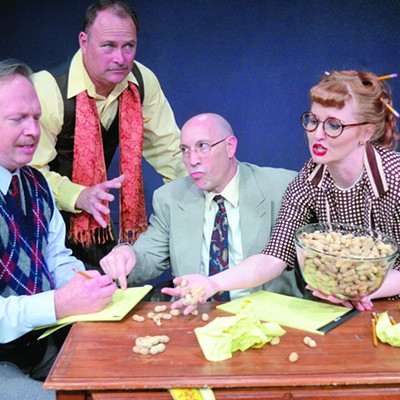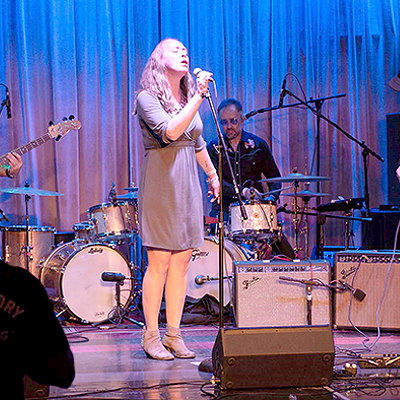She laughs when she says it, but to those willing to confess, The Handsome Family offers empathy, comfort, and a redemption far gentler than was their own. The band's February release, In the Air, is duo's most beautiful to date, framing gothic tales and unflinching psychological insights in cubist pastoral imagery and music so traditional, so memorable, your great-grandmother might have sung it to her babies to keep out the night.
It was not always so. In 1995 when Rennie and Brett Sparks and their then drummer, Mike Werner, released Odessa, their first record as The Handsome Family, it was something of a joke. Brett says the record embarrasses him now; he hasn't been able to listen to in years.
"In a way I felt like the first record was a thing to hurt people," Rennie says. " 'Here. Listen to this crap.' We really felt anti-social. All I knew was what I hated; I didn't have anything I liked. I just basically wanted everybody to hate me and then I'd have an excuse to, like, leave this fucking place." She means terminally.
Critics, perversely, raved. It's only in retrospect that Odessa's fusion of punk rage, retro folk-twang, and pitch dark storytelling set in Dadaist imagery seem ragged and uneven. At the time its originality alone won over hardcore music geeks, misfits by nature. On subsequent CDs--Milk and Scissors in 1996, Through the Trees in 1998 and especially In the Air, the quality of the Sparks' ideas, musically and lyrically, and the cohesion of their presentation, have matured to the point that they cut to the essence of humanity like a tempered steel dagger through fresh-fallen snow.
The Handsome Family's artistic turning point may have been their limited edition, 6-song secular Handsome Family hymnal, the vinyl LP Invisible Hands, released in 1997. The product of an especially dark time in Rennie's life, the record's lyrics represent her first steps in a new direction, using music not to reinforce her sense of alienation, but to try to feel better.
"Depression really sucks," says Rennie. "It's so boring. Everybody's depressed! I think it's the human condition. But I think there are things you can do to make yourselfäfeel better. I've been trying really hard to write some happy songs. Not like 'YAY! LIFE!' but maybe just some kind of acceptance and serenity in defining some kind of place where you can be at peace. To a certain extent your life is what you believe it is. You can make it a little more tolerable if you can imagine that it could be more tolerable."
Two of the songs from Invisible Hands re-appeared on Through the Trees, "Bury Me Here" and "Cathedrals." Another, "Grandmother Waits for You," surfaces on In the Air. The songs hang loosely around themes of peaceful acceptance of fateful circumstances and eternal life in serenity, a notion that comforts Rennie, despite its inconsistency with her Jewish faith. Brett paired her stories, filled with stark imagery drawn from nature, with music that feels like old hymns, a genre in which he is well-versed by upbringing.
The notion of "invisible hands" could as easily give someone the creeps. Just this sort of ambiguity is a hallmark of Rennie's writing. "Basically all I do is think about opposites," she says. "I just obsess a lot about how nature is beautiful and it's ugly, it's kind and it's cruel, sad and happy, life and death, all these things. I think I just try to approach that essential problem." Her working thesis is that whether something is one or the other depends on how you think about it. In the soothing opening ballad of In the Air, "Don't Be Scared," a reference is made to a phone that rings just once late at night. A stalker? Wrong number? Or a gentle reminder that you're not all alone in the world? In the song, Rennie's chosen the latter. More eerily, in "Lie Down" she makes even the prospect of drowning seem like an invitation back to the comforts of the womb. She makes her point: "That's the way your life is. You go outside and you see something happen and you, in your head, decide 'Is that a happy thing?' "
The Handsome Family sings a lot about death, without apology. Besides "Lie Down," In The Air includes the ambiguous "Poor, Poor Lenore," in which a heartstricken, rejected lover is carried off by sympathetic crows, and "The Sad Milkman," which may or may not suggest suicide. Rennie says either point of view is acceptable. In addition, there are two outright murder ballads, the traditional man-kills-love-object-selfishly "My Beautiful Bride," and the utterly remorseless, fratricidal "Up Falling Rock Hill."
"It doesn't purely come from our own morbidity, but it does have a tradition in American folk music," Brett explains. "Our favorite music is like that, too. It tells these little didactic morality tales. Stuff by the Blue Sky Boys, the Louvin Brothers, the Carter Family and you can go on and on. There are lots of mother songs, lots of songs about heaven, and there's the murder thing. There are a lot of songs about murder that are written with that kind of bone-chilling lack of emotion, with an almost newspaper-like presentation. That's kind of what those songs originally were, oral histories about people who got killed, like Omie Wise."
The tradition has parallels in England and Ireland, so it's not surprising that The Handsome Family's music quickly found a home there. Not incidentally, the culture there also prizes the dark, quirky wit which characterizes not only Rennie's lyrics, but also the pair's onstage banter. After Through the Trees, the British and the Irish couldn't get enough of them. The Sparks made six visits there and they say they were treated like rock stars.
"You tend to see that there's a strictly American attitude toward depressing things," Rennie says. "I really think that's why so many fucking Americans are all taking antidepressants. Everybody's depressed but nobody wants to admit it because it's like this horrible, dark thing, that if you talk about it will just get worse, if you write songs about it will just get worse, if you listen to music about sad things it will just get worse.
"Happy endings! Happy songs! I think that's why we have this big problem. Everything in America is happy and great and inside everybody's thinking, I'm gonna kill everyone on my block and then I'm gonna shoot myself in the head." She laughs. "It's because they just feel so distanced from what they think they should be getting from their life."
What the Handsome Family is getting from their lives these days is something like community. From writing songs out of their alienation, they've evolved to sending smoke signals to like minds.
"You know, every once in a while someone would say 'Oh, I really like this song'," explains Rennie, "and the more they said they liked the 'real' songs and not the stupid songs, I realized that we actually could write real songs."
Says Brett, "I think we're more focused now on creating the beautiful objects that we want to create. We're not really as focused on the personalities." Rennie adds, "I just like the idea, to be able to write a song that somebody else could enjoy, have some kind of emotional response and remember or want to sing. Now I'm focused more on not me at all but maybe like something we could all agree on. 'Look, I feel exactly the way you feel. We're all the same.' "
The Handsome Family performs Wednesday, June 28 at 9 p.m. at Modified in Phoenix, call 602-252-7664 for more information.















